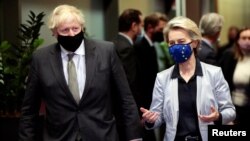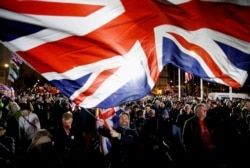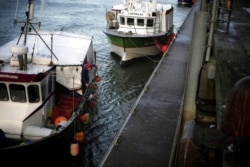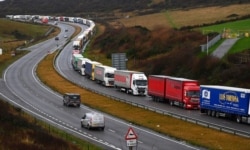European Union leaders say the most likely outcome after months of fractious haggling with London is that Britain will leave the bloc at the end of the year without a trade and security deal — an upshot that will have serious economic repercussions on both sides of the English Channel and could poison relations between the EU and the British for years to come.
During a short briefing at the end of an all-night summit in Brussels, Ursula von der Leyen, European Commission president, told the EU’s 27 national leaders that there was a “higher probability for no deal than a deal,” according to officials.
With a firm Sunday deadline for talks looming, Britain’s Boris Johnson echoed the EU president’s pessimism, saying a no-deal outcome from Brexit trade talks was “looking very, very likely.”
The prime minister suggested a breakthrough in the deadlocked talks would need a “big offer, a big change” from the EU, but that he had “yet to see it.”
But unlike the Europeans, Johnson sounded an upbeat note, adding: “It is looking very, very likely that we will have to go for a solution that I think would be wonderful for the UK, and we'd be able to do exactly what we want from January 1.”
Some see limitless possibilities
Britain’s Brexiters have long maintained that once free from the EU, the country’s commercial possibilities will be limitless and they can compensate for any losses by striking trade agreements with a host of other countries.
It isn’t a view shared by much of British business nor the Bank of England, which has warned that leaving the EU without a deal could reduce Britain’s GDP next year by 6 percent.
British businesses say a no-deal Brexit will cause massive disruption to trade, with exporters and importers facing new, burdensome border checks, costly customs paperwork and higher prices. Restrictions on the number of British trucks allowed to enter the EU would mean an estimated two-thirds of British businesses would find it difficult to trade in the bloc at all, according to some haulage experts.
British-manufactured cars exported to the EU would face tariffs of about 10 percent, dairy products 35 percent, and meat more than 40 percent. Nearly half of all foods consumed in Britain come from EU countries, and supermarkets are warning there will be less choice on their shelves and there will be inflationary price hikes if a deal eliminating tariffs and reducing trade barriers isn’t struck.
Border disruption also will affect the importation of medicines from Europe, a major supplier for Britain, leading to shortages and, again, higher prices, Britain’s pharmacists have warned.
Without a deal, it remains unclear to what extent British banks and financial institutions will be allowed to operate on the continent. Some international banks likely would shift some of their operations to EU countries.
Key disputes
Midweek, Johnson flew to Brussels for face-to-face talks with von der Leyen over a three-hour fish dinner. The two had “frank” discussions, according to officials, but failed to bridge the gap in two key areas — EU fishing access to Britain’s coastal waters and regulatory alignment.
Of these, the bigger dispute involves regulatory alignment, with both sides at loggerheads over shared regulatory rules and competition, and safety standards to ensure businesses in Britain do not have an unfair competitive edge over their EU rivals. Lower standards mean lower costs and lower prices for finished goods, giving British manufacturers an advantage over continental competitors.
Brussels insists that Britain should follow EU rules closely, including workers' rights and environmental regulations. British officials have taken special offense with Brussels’ demand that Britain would have to comply with the bloc’s rules, even as they evolve, without having had any say in their development.
Johnson has said the whole point of Brexit was to “take back control,” to break free from following EU common rules and to reassert national sovereignty. But EU officials say common rules are the price to pay for access to the bloc’s lucrative single market, the world’s largest free-trade bloc, and they note all trade treaties normally require agreed competition rules that can and do change over time.
A no-deal exit by Britain when its transition period out of the EU ends on December 31 will also end cooperation on security and intelligence data-sharing. British police will lose access to the EU database of convictions, wanted suspects, DNA and fingerprints.
“Workarounds for access to the databases would all involve more time and effort. And in this business, speed equals security, so loss of real-time connectivity makes us all less safe,” a former British national security chief, Peter Ricketts, warned Friday.
Plea for cooler heads
Some EU leaders say they're still holding out hope for a deal, but also insist sharp rhetoric on both sides needs to be reduced. Speaking in Berlin, Irish Foreign Minister Simon Coveney told reporters: “We need to try and dial down the language in terms of the division and differences of views and focus on the detail. There is a bigger picture here that goes beyond trade in a world that is changing and has a lot of risk.”
He said: “The idea that the UK and EU cannot put a good, constructive, positive partnership in place in the context of that new relationship ... I think that would be an enormous lost opportunity and both sides will be weaker as a result.”
His call to drop vitriolic language was ignored by some British Conservative lawmakers. “Have our EU ‘friends’ no regard or respect for the UK and our nation's sacrifices that permit them to live in freedom and prosperity today, safely away from the shadow of totalitarianism?” tweeted Imran Ahmad Khan, a Conservative MP from the north of England.
“The EU’s contemptuous treatment of the UK makes it clear there cannot be a deal until it accepts the UK as a sovereign equal and awards us the respect and regard we merit,” Khan added.
There will also be repercussions for the EU from a messy British exit, with member countries collectively suffering an estimated $40 billion in lost annual exports. But the impact will largely be borne across all 27 member countries, although Ireland, France, Germany, the Netherlands and Belgium are expected to take the biggest hit.
France will lose an estimated $4 billion a year in diminished exports to Britain, according to some studies, with 30,000 French firms impacted, many in the wine and drink sector. Ireland could suffer a 6 percent reduction in its GDP next year in the event of a no-deal Brexit.










